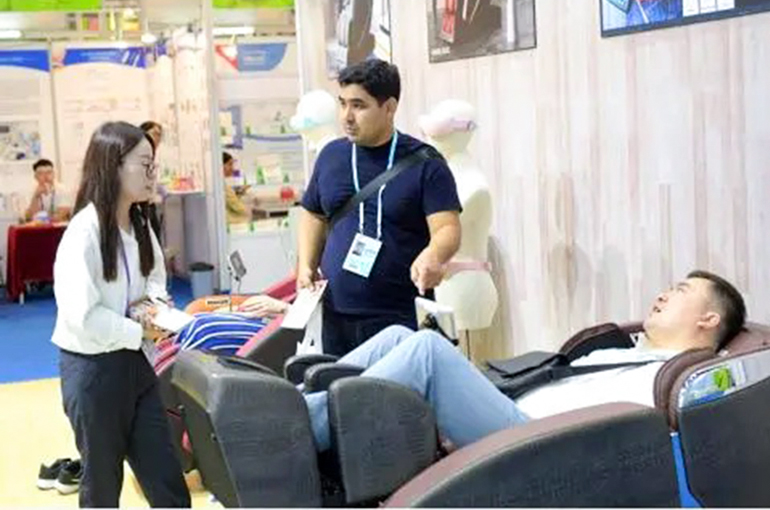 BRI, E-Commerce Buoy Exports From China’s Chair Production Hub
BRI, E-Commerce Buoy Exports From China’s Chair Production Hub(Yicai) Dec. 5 -- Exports of furniture by companies in Anji, a county in China’s Zhejiang province well-known for its chair industry, have bounced back thanks to cross-border e-commerce and the Belt and Road Initiative, a huge China-led global infrastructure project.
Wanbao Furniture’s exports have surged about 107 percent to a record high this year, ending a decline that began in 2021, Xue Dong, general manager of the Anji-based company, told Yicai. Its staff often work overtime because of a labor shortage, he noted.
Wanbao has been investing more in online channels, Xue said. Its output value may exceed CNY300 million (USD42 million) this year, and sales could near CNY1 billion (USD140 million), as the company can sell products at three times the price on trans-border platforms such as Amazon, he added.
Cross-border e-commerce and the BRI, launched 10 years ago, have been instrumental in helping Chinese businesses expand worldwide, boost sales and earnings, reach international consumers directly, enhance their competitiveness, and mitigate the risks associated with dependence on a single market.
Wanbao is also actively exploring emerging markets, with Xue saying that orders from Russia, from where he had just returned, are growing exponentially. He also went to Malaysia in the first half of the year and is planning to take part in an exhibition in Dubai this month.
Many businesses for which foreign trade accounts for more than 80 percent of their business have benefited from the growth of cross-border e-commerce, said Wang Lin, a manager at Henglin Home Furnishings.
The Anji-based company has embraced new product categories in recent years, including panel furniture and new-material floorings, in addition to office chairs and sofas, to strengthen its resilience to risks, Wang added.
Besides a team dealing with business in developed countries, Henglin formed a working group in the Middle East this year, Wang noted. Its revenue jumped 25 percent to CNY5.8 billion in the nine months ended Sept. 30 from a year ago, while net profit rose 23 percent to CNY366 million.
The Anji government has also come out with policies to encourage companies to take part in overseas exhibitions. In addition to trans-border e-commerce, Russia and the Middle East have good market prospects, which will become a focus of cooperation between the local government and local firms, said a manager at Anji’s commerce bureau.
However, a number of leading companies have moved some production to Southeast Asia or other regions because of the US’ requirements on the origin of goods.
UE Furniture aims to speed up construction of overseas bases, with its plant in Romania having already begun operations, it said. The firm is promoting lean production, inventory optimization, efficiency improvements, and local supply chain construction at its base in Vietnam, it added. UE’s nine-month net profit fell 26 percent to CNY211 million on a 22 percent drop in revenue to CNY2.5 billion.
Editor: Martin Kadiev